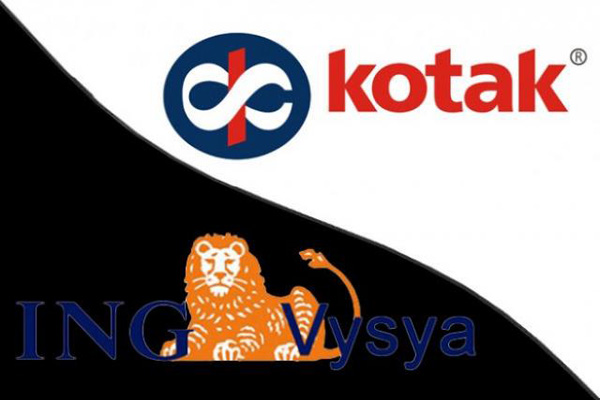Mumbai: Kotak Mahindra Bank on Thursday acquired Bangalore-based, ING Vysya Bank, in which Dutch financial services group ING has a 42.73 percent stake, in an all-stock deal. The speculation on the merger was in the market for some time. Shares of both entities surged over 7 percent each on Thursday.
The deal announcement came after the market hours. Earlier in the day, shares of Kotak Mahindra ended at Rs1,157.05 apiece, up 7.28 percent, while ING Vysya ended at Rs814.20, up 7.15 percent on BSE, while India’s benchmark index, Sensex closed at 0.12 percent up at 28067.56 points.
The deal will make Kotak the fourth largest private bank with combined assets of Rs1,60,012 crore (replacing Yes Bank, which had total assets of Rs1,16,231 crore as on September) and total branches of 1,214.
The resultant entity will have total deposits of Rs 1,12,755 crore and advances of Rs1,00,506 crore. Whichever way one looks at it, the deal will be a win-win situation for both Kotak and ING Vysya.
For Kotak, which has long been looking for a target to acquire, an acquisition will change its image as a small niche bank and become one of the private big ones. A merger will give Kotak access to cheaper deposits of ING Vysya and its strong franchise in the southern states.
As at end September, ING Vysya had 33 percent of its total deposits as current, savings account deposits (CASA). Kotak had 31 percent of its deposits as cheaper deposits. Cheaper deposits are critical for a bank to manage its cost of borrowing. Based on financial parameters, both are sound entities. ING has gross non-performing assets (NPAs) of less than 2 percent and has a capital adequacy ratio of over 14 percent. Kotak too have maintained its gross NPA levels consistently at less than 2 percent.
Both banks are traditionally focused more on corporate and retail banking side. Loans to large corporations and SMEs together constituted about 70 percent of the total loan book of ING, as at end September, while for Kotak corporate loans constitute about 55 percent. That apart, ING Vysya’s strong presence in the SME space will benefit Kotak.
The merger is at a swap rate of 725:1000 (725 Kotak shares for every 1000 shares held by ING Vysya shareholders). The combined share base of the resultant entity will be 90.93 crore shares. (Currently Kotak Mahindra bank has 77.13 crore total shares and ING Vysya 19.03 crore). The deal has happened at a valuation of Rs15,964 crore. The shares will be swapped at a premium of 3 percent.
Given that Uday Kotak and family, promoters of Kotak Mahindra Bank, currently hold 40.07 percent, post merger, on the expanded share base, the promoters’ holding in the resultant entity will come down to 34 percent.
This is something critical for Kotak given that there is an RBI deadline for Kotak’s promoters to bring down promoter stake to 30 percent by December 2016 and 20 percent by March 2018.
Kotak has been trying to bring down his stake in the bank over years. In May this year, Kotak had sold 3.24 percent. On the other hand, ING too has been trying to exit the bank. It had increased the stake in the Bangalore-based Vysya Bank in 2002 to 44 percent. As per the terms of the deal, ING group will have a lock-in period of one year.
Presently, ING group has 42.73 percent in the bank, owned by two entities–ING Mauritius Holdings and ING Mauritius Investments. In the new entity, ING group will be the second largest shareholder with a stake holding of 6.5 percent
In recent years, RBI has been putting pressure on a host of private banks to bring down the promoter holding in phases to about 10 percent. These include DCB Bank Ltd (promoter Aga Khan Fund which holds 18.42 percent), Catholic Syrian Bank (single largest shareholder Sura Chansrichawla holds over 10 percent and IndusInd Bank (Hindujas together hold 15.13 percent).
There haven’t been too many mergers in the private banking industry. The last time a merger in the private banking space happened was in 2010 when ICICI Bank acquired Bank of Rajasthan. Before that HDFC Bank acquired Centurion Bank of Punjab in 2008.
So far, RBI has issued three rounds of licences to private banks. The first was in 1993-94, when RBI issued licences to 10 private banks. They were Global Trust Bank Ltd, ICICI Bank Ltd, HDFC Bank Ltd, Axis Bank Ltd, Bank of Punjab, IndusInd Bank Ltd, Centurion Bank Ltd, IDBI Bank Ltd, Times Bank and Development Credit Bank Ltd.
In 2003-04, RBI issued licences to two more banks—Kotak Mahindra Bank Ltd and Yes Bank Ltd – and last year to two more—IDFC and Bandhan.
Times Bank was merged with HDFC Bank in February 2000 and later Global Trust Bank was merged with Oriental Bank of Commerce in August 2004. Bank of Punjab was acquired by Centurion Bank in June 2005 to form Centurion Bank of Punjab.
Consolidation among private banks, especially those operating in same segments, could create larger, stronger, deep-pocketed entities with more understanding in operations.
The Kotak-ING Vysya merger, thus, will take Kotak to the league of big four among the private banks and will most likely be a happy marriage for both.

